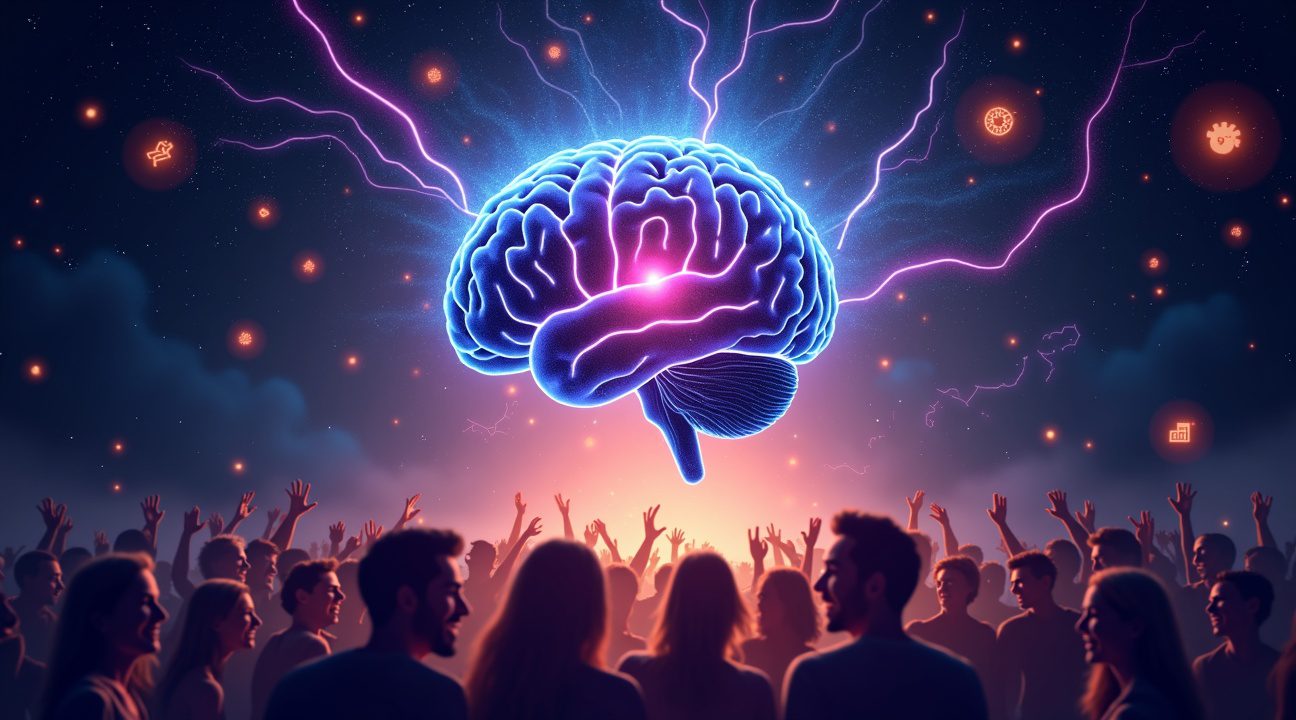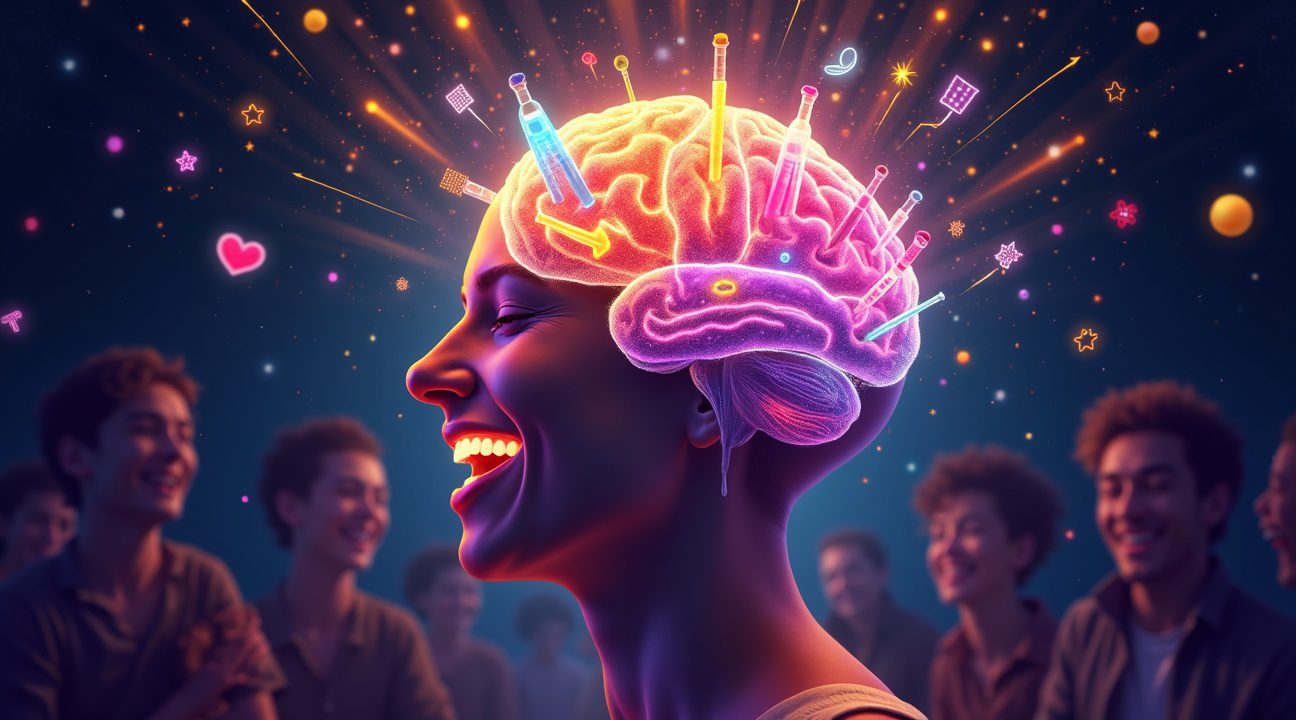Revolutionary research demonstrates that laughter functions as a potent cognitive enhancer, cutting stress hormones by up to 50% while boosting memory performance in older adults.
These discoveries show that humor creates measurable biochemical changes in the brain, including heightened gamma wave activity and the release of beneficial neurotransmitters that guard against age-related cognitive decline.
Key Takeaways
- Laughter cuts cortisol levels by up to 50% in older adults, establishing optimal conditions for hippocampus function and memory formation.
- A 20-minute humor session generates measurable improvements in short-term memory performance and recall abilities compared to control groups.
- The brain releases dopamine, serotonin, and endorphins during laughter, establishing an ideal neurochemical environment for learning and cognitive flexibility.
- Regular laughter increases gamma wave frequency, synchronizing neurons across brain regions and strengthening neural connections for enhanced information retention.
- Incorporating structured laughter interventions into wellness programs delivers evidence-based therapeutic benefits for cognitive health and emotional resilience.
To explore further insights on the cognitive benefits of laughter, visit this NCBI research article.
Laughter Slashes Stress Hormone by 50% and Supercharges Memory in Older Adults
I’ve discovered something remarkable about how laughter affects older adults’ brains. Humor doesn’t just feel good – it triggers powerful biochemical changes that protect memory and cognitive function. Research shows that simply anticipating humor can decrease cortisol levels by up to 50% in older adults, creating a cascade of brain health benefits.
Cortisol acts as the body’s primary stress hormone, but when chronically elevated, it becomes a serious threat to brain health. This hormone specifically targets the hippocampus, the brain region responsible for learning and memory formation. Brain health research consistently demonstrates how excessive cortisol damages hippocampal neurons, leading to memory problems and cognitive decline.
Humor Directly Enhances Memory Performance
A groundbreaking study revealed the immediate memory benefits of laughter in elderly participants. Those who watched a 20-minute funny video showed significantly better short-term memory performance compared to control groups who didn’t experience humor. The results weren’t subtle – participants demonstrated measurably improved recall and retention abilities after their laughter session.
The mechanism behind this improvement connects directly to cortisol reduction. When laughter decreases stress hormone levels, it removes a major obstacle to proper hippocampus function. This brain region operates optimally under low-stress conditions, and humor creates exactly that environment. Lower cortisol levels allow neurons to communicate more effectively, strengthen memory consolidation, and enhance the formation of new memories.
I find it fascinating that the anticipation of humor produces these benefits even before the actual laughter occurs. This suggests that the brain’s expectation of positive experiences can trigger protective responses. The mere thought of something funny begins the process of stress hormone reduction, preparing the brain for optimal cognitive function.
The protective effects extend beyond immediate memory improvements. Regular laughter sessions may help preserve hippocampus structure over time, potentially slowing age-related cognitive decline. Memory research indicates that maintaining low cortisol levels through consistent humor exposure could serve as a natural defense against dementia and other memory disorders.
These findings suggest that incorporating humor into daily routines isn’t just enjoyable – it’s a legitimate brain health strategy. Twenty minutes of laughter can create measurable improvements in memory function while simultaneously protecting against the damaging effects of chronic stress. For older adults seeking to maintain cognitive vitality, humor represents an accessible, enjoyable, and scientifically-backed approach to brain protection.

How Laughter Rewires Your Brain for Better Cognitive Performance
Recent scientific discoveries reveal that laughter creates profound changes in brain activity that directly enhance cognitive function. I’ve found this research particularly compelling because it demonstrates how a simple human behavior can generate measurable improvements in mental performance.
The Neural Symphony of Laughter
Laughter triggers a fascinating phenomenon in the brain by increasing EEG gamma wave frequency. These high-frequency brain waves act like a conductor’s baton, synchronizing neurons across different brain regions. This synchronization isn’t just a temporary effect – it creates lasting improvements in memory formation and cognitive processing abilities.
The research shows that when gamma waves fire in unison, they establish stronger neural connections that enhance information retention and recall. This finding connects to broader research about brain potential and how simple activities can optimize mental function.
Oxygen, Rewards, and Enhanced Performance
Beyond neural synchronization, laughter delivers tangible physical benefits to brain tissue. The act of laughing significantly boosts oxygen-rich blood flow throughout the brain, creating an environment that supports optimal neural health. This increased circulation may serve as protection against cognitive decline and potentially reduce the risk of developing diseases like Alzheimer’s.
The brain’s response to laughter also activates the mesolimbic dopaminergic reward system – the same network responsible for motivation and pleasure. This activation creates a positive feedback loop that enhances focus and drives continued engagement with challenging tasks. Research demonstrates that regular laughter exercises can measurably improve productivity and spark creative thinking.
These neurological changes work together to create what I consider a natural cognitive enhancement system. Unlike artificial stimulants or complex interventions, laughter provides a sustainable way to optimize brain function while simultaneously improving mood and social connections.
The implications extend beyond immediate performance gains. Scientists studying memory phenomena have noted that the same neural pathways activated by laughter overlap with those involved in forming lasting memories. This overlap suggests that incorporating humor into learning and work environments could create compound benefits for long-term retention and cognitive resilience.
Professional environments that encourage appropriate humor often see improved problem-solving capabilities and enhanced team performance. The dopaminergic reward activation makes challenging tasks feel more manageable while the increased oxygen flow maintains mental clarity throughout demanding projects.

The Chemical Cocktail: How Laughter Floods Your Brain with Feel-Good Neurotransmitters
I find it fascinating how a simple chuckle can trigger such a powerful chemical response in your brain. When you laugh, your brain becomes a bustling pharmacy, releasing an impressive array of neurotransmitters that work together to enhance your mood and cognitive function.
The Power Trio of Brain Chemistry
Laughter acts as a master key that unlocks the release of three crucial brain chemicals:
- Dopamine floods your neural pathways, creating a satisfying sense of pleasure and reward. This neurotransmitter doesn’t just make you feel good—it sharpens your focus and drives motivation, making you more productive in whatever task follows your laughter session.
- Serotonin joins the party as your brain’s natural mood stabilizer. This chemical messenger promotes feelings of calmness and well-being while simultaneously boosting your creative thinking capabilities. Scientists have observed that higher serotonin levels help people approach problems from fresh angles and generate innovative solutions more easily.
- Endorphins are your brain’s built-in painkillers. These remarkable compounds are actually more potent than morphine, yet they’re produced naturally every time you have a hearty laugh. Endorphins don’t just mask discomfort; they create genuine feelings of euphoria and contentment that can last for hours after the laughter subsides.
The dopamine and serotonin release that occurs during laughter creates what researchers call an optimal cognitive state. Your mind becomes more flexible, alert, and open to new information. This chemical combination explains why brainstorming sessions often work better when teams incorporate humor and why creative breakthroughs frequently happen in relaxed, jovial environments.
What makes this process even more remarkable is how quickly it happens. Within seconds of genuine laughter beginning, your brain starts pumping out these beneficial chemicals. The endorphin production peaks during intense laughter and can continue affecting your mood for up to 45 minutes afterward. This extended effect means that a single funny moment can influence your mental state well into your next activity.
These neurotransmitters work synergistically rather than independently:
- Dopamine primes your brain for learning and memory formation.
- Serotonin creates the calm mental environment necessary for deep thinking.
- Endorphins clear away stress-related mental fog, allowing these other chemicals to work more effectively.
This is similar to how quality sleep affects brain function, creating optimal conditions for mental performance.
The beauty of this chemical response lies in its accessibility. Unlike some brain-boosting activities that require special equipment or training, laughter is available to anyone at any time. Whether you’re watching a comedy, sharing jokes with friends, or simply finding humor in everyday situations, you’re actively improving your brain chemistry.
Research shows that people who laugh regularly maintain higher baseline levels of these beneficial neurotransmitters. This means frequent laughers don’t just experience temporary mood boosts—they develop more resilient brain chemistry that supports better mental health over time. The cumulative effect creates a positive feedback loop where good mood makes it easier to find things funny, which then reinforces the good mood.
Understanding this neurochemical process helps explain why laughter has such profound effects on memory and learning. When your brain is flooded with dopamine, serotonin, and endorphins, it creates ideal conditions for forming new neural connections and strengthening existing ones. This chemical environment is particularly beneficial for memory consolidation, the process by which short-term memories become permanent.
The timing of this chemical release also matters for practical applications. Incorporating laughter into study sessions or work meetings can prime your brain for better information retention and creative problem-solving. The neurotransmitter boost doesn’t require extended comedy sessions—even brief moments of genuine amusement can trigger meaningful chemical changes that enhance cognitive performance.

Laughter as Medicine: Emotional Regulation and Resilience Benefits
I’ve discovered that laughter serves as a powerful medicine for emotional well-being, offering significant advantages for those struggling with stress and challenging life circumstances. Research demonstrates that regular laughter strengthens our ability to regulate emotions effectively, creating a natural buffer against psychological strain.
The science behind laughter’s therapeutic effects reveals fascinating connections between humor and emotional processing. When people laugh, their brains release endorphins and reduce cortisol levels, creating an optimal environment for emotional stability. This biochemical response helps individuals maintain psychological balance during turbulent periods, much like how proper sleep enhances brain function.
Laughter functions as a sophisticated coping mechanism that transforms how we process difficult experiences. During grief or trauma, appropriate humor can provide relief without diminishing the significance of painful emotions. I’ve observed that people who incorporate laughter into their healing process often develop stronger resilience over time. This doesn’t mean avoiding serious emotions, but rather finding moments of lightness that help restore emotional equilibrium.
Building Emotional Strength Through Humor
The resilience-building properties of laughter extend far beyond momentary relief. Consider these key emotional benefits that regular laughter provides:
- Enhanced stress tolerance through improved emotional regulation
- Increased ability to reframe negative situations with perspective
- Strengthened social connections that support emotional recovery
- Greater psychological flexibility when facing unexpected challenges
- Improved capacity to bounce back from setbacks more quickly
These advantages create a cumulative effect, where each laughing episode contributes to long-term emotional strength. People who laugh regularly report feeling more equipped to handle future stressors, suggesting that humor builds lasting psychological resources rather than offering only temporary escape.
Positive emotions generated through laughter create ripple effects throughout daily life. I notice that individuals who cultivate humor tend to experience greater life satisfaction and maintain more optimistic outlooks. This emotional boost influences decision-making, relationships, and overall mental health outcomes.
The therapeutic value of laughter becomes particularly evident during collective challenges or personal crises. Shared laughter strengthens social bonds while simultaneously providing individual emotional relief. This dual benefit makes humor an exceptional tool for community healing and personal growth.
Incorporating intentional laughter into daily routines can significantly improve emotional regulation skills. Whether through comedy, playful interactions, or humorous content, regular exposure to laughter creates new neural pathways that support emotional resilience. This natural medicine requires no prescription and produces no negative side effects, making it an accessible wellness strategy for anyone seeking enhanced emotional well-being.
Practical Applications: Incorporating Laughter into Wellness Programs
Healthcare professionals and wellness coordinators can implement structured laughter interventions that deliver measurable clinical and rehabilitative benefits. These programs work particularly well for older adults, where cognitive decline becomes a primary concern. I’ve observed how systematic approaches to humor integration create environments that support both mental acuity and emotional well-being.
Evidence-Based Laughter Interventions
Research demonstrates that anticipating humor can decrease cortisol levels by nearly 50% in older adults, creating optimal conditions for memory formation and retention. This dramatic reduction in stress hormones establishes a neurochemical environment where the brain functions more efficiently. Wellness coordinators can leverage this finding by structuring programs around several key components:
- Scheduled humor sessions that allow participants to anticipate and prepare for laughter
- Interactive storytelling activities that encourage memory recall and sharing
- Group laughter exercises that combine physical movement with cognitive engagement
- Comedy appreciation sessions featuring age-appropriate content that resonates with participants
Laughter exercises improve focus, productivity, and creativity across age groups, making them valuable additions to both senior care facilities and educational settings. Students benefit from brief humor breaks during study sessions, while older adults experience enhanced cognitive flexibility through regular laughter activities. Just as quality sleep supports brain function, intentional laughter creates neural pathways that strengthen memory consolidation.
Healthcare facilities can integrate laughter therapy into existing rehabilitation protocols. Physical therapy sessions become more engaging when therapists incorporate appropriate humor, leading to better patient compliance and faster recovery times. Occupational therapists find that patients who participate in laughter-based activities show improved motor coordination and increased willingness to attempt challenging tasks.
Memory care units particularly benefit from structured humor programs. Residents with early-stage cognitive decline often retain their sense of humor longer than other cognitive functions. This preserved ability becomes a bridge for maintaining social connections and emotional stability. Activities directors can design programs that tap into familiar comedy routines, nostalgic entertainment, or simple wordplay that doesn’t require complex processing.
Corporate wellness initiatives also gain significant value from laughter integration. Employees who participate in humor-based team-building activities report decreased stress levels and improved workplace relationships. These programs don’t require expensive equipment or extensive training, making them cost-effective additions to existing wellness offerings.
The timing of laughter interventions matters significantly. Morning sessions help establish positive mood states that persist throughout the day, while afternoon programs can combat the natural energy decline many people experience. Brain research continues to reveal how different activities affect cognitive performance at various times.
Successful wellness programs combine spontaneous humor opportunities with structured laughter exercises. Participants learn techniques they can use independently, creating sustainable benefits beyond formal program hours. This dual approach ensures that individuals develop personal strategies for maintaining cognitive health while benefiting from group dynamics during organized sessions.
Documentation and assessment tools help wellness professionals track program effectiveness. Simple mood scales, memory assessments, and participant feedback provide measurable data that support program continuation and expansion. Insurance providers increasingly recognize these interventions as legitimate therapeutic approaches, opening funding opportunities for facilities willing to implement evidence-based programs.
Training requirements for staff remain minimal, making program implementation feasible across various healthcare settings. Basic guidelines focus on creating safe, inclusive environments where all participants feel comfortable expressing themselves. Staff members learn to distinguish between therapeutic humor and inappropriate comedy, ensuring programs maintain professional standards while delivering meaningful benefits.
The integration of technology can enhance traditional laughter therapy approaches. Digital platforms allow for remote participation, extending program reach to homebound individuals or those in rural areas. Virtual reality applications create immersive comedy experiences that engage multiple senses simultaneously, potentially amplifying the cognitive benefits observed in traditional face-to-face programs.

Sources:
Stanford Lifestyle Medicine, “Brain Health Benefits of Laughter”
Loma Linda University Health, “Laughter: Improve Short Term Memory”
Loma Linda University, “Laughter: A fool-proof prescription”
Nuvance Health, “Your brain on laughter”
Whole Health Library, “The Healing Benefits of Humor and Laughter”
Blue Zones, “Laughing is Good for Your Mind and Your Body”


